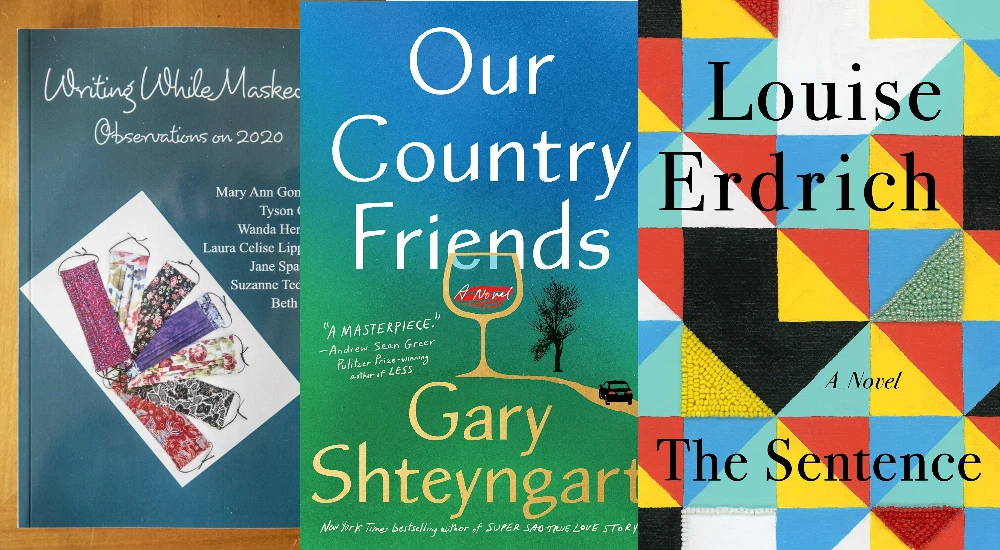
When life goes askew as it did two years ago, some turned to writing and, thanks to those writers, we can now view the world with more humanity and clarity. I am thinking about some books I’ve read that use the pandemic as a main character, so here are three memorable books from vastly different authors.
Writing While Masked

The first that I read, Writing While Masked: Observations on 2020, was authored by seven Seattle women, members of a writing club. The seven, all retired from professional careers, had been meeting for a dozen years, sharing and offering advice on their writing — fiction and nonfiction, prose and poetry. When the pandemic hit, they set out trying to make sense of it all, not wanting to forget the little things.
Before the pandemic, they gathered in one another’s homes. Once the pandemic struck and the city went into lockdown, they turned to meeting by Zoom. After months of recording their experiences, they decided to self-publish, relying on skills learned during their working years at places like Microsoft. Proceeds from the initial printing — several hundred books priced at $14.95 — went to Literary Source, which offers free classes and tutoring to King County adults. Comes now an expanded sequel, Writing While Masked, which is being published by Washington University Press. Copies with the jazzy new cover should reach local bookstores by the new year.
Our Country Friends

While book-club amateurs were writing about the pandemic, so too were nationally-known authors. The first pandemic novel I picked up was Gary Shteyngart’s Our Country Friends, a book so evocative of the time, so filled with humor and absurdity, laughter and tears, that I simply couldn’t put it down. The story is a classic: A Russian-born novelist — perhaps modeled on the author himself — summons eight friends, unlikely characters all, to his country house (his “dacha”) to wait out the pandemic.
Shteyngart’s novel delivers rich descriptions of food and of the natural world in the hills of upstate New York. Although the privileged friends are living in a self-imposed bubble, isolated from their customary worlds, they do see video of George Floyd’s murder and learn about the protests and the reason behind the many “Black Lives Matter” signs. The friends’ stories of family, sex and betrayal read like Chekhov meets Boccaccio. This surely is Shteyngart’s standout novel, a masterpiece that long will be read to understand the leveling experience of the deadly virus.
The Sentence

The third book written during the pandemic that I found unforgettable was Louise Erdrich’s The Sentence. The Pulitzer Prize-winning author (The Night Watchman) tells the story of Tookie, a native American woman, who works in a Minneapolis bookstore that specializes in books about indigenous people. (Erdrich not surprisingly dedicates her book to “everyone who has worked at Birchbark Books and to our customers and our ghosts.”)
At first Tookie alone is haunted by the ghost in the bookstore. It is the spirit of the recently deceased Flora, Tookie’s most troublesome customer. At that point, the coronavirus arrives and everything that was almost normal is turned upside down.
Tookie finds herself haunted, not only by Flora, but by other ghosts from her past: her misspent youth, her time in prison, her mother’s addiction and death, and by concern that she is forever fated to mess things up. After George Floyd is murdered in Tookie’s city, the idea of ghosts expands to include Minnesota’s brutal treatment of the area’s original people. Tookie says, “We can’t undo history but we are forced to either confront or repeat it.”
The Sentence takes on an almost indigestible quantity of subplots, but the stories all have value. The narratives not only grip our attention, but echo the crazy twists of the weird and unsettling pandemic year. Among the book’s many take-aways is a renewed appreciation for the books that Tookie sells and for the power that books have to change lives and heal us.
I keep going back to a quote in The Sentence. Erdrich highlights the words of Sun Yung Shin: “From the time of birth to the time of death, every word you utter is part of one long sentence.”
Discover more from Post Alley
Subscribe to get the latest posts sent to your email.

Thanks for bringing “Our Country Friends” to my attention Jean. Looks like a good Christmas gift!
Terrific Christmas book, Steve. In fact I have a couple ordered. It’s the kind of book you don’t want to end and may want to read a second time when you do turn the last page. Characters so real that they MUST be based on real counterparts.